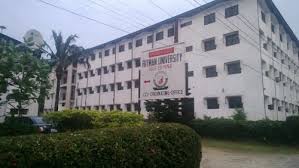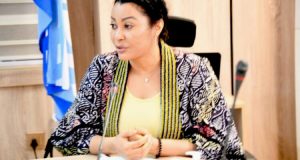Ritman University joined the rest of the world in celebrating United Nations’ International Mother Language Day on Tuesday 21st February, highlighting the beauty and development potential of native languages.
Event lecturer, Dr. Joseph Udondata – Acting Dean of Ritman University’s Humanities faculty – disagreed with the designation of Igbo, Hausa and Yoruba as “major languages” of Nigeria, contending that such recognition robs the nation of benefits accruing from our multilingual, multicultural heritage.
Vice Chancellor of the university, Professor Celestine Ntuen, cited research evidence to prove that the native language one speaks may determine how his brain solves mathematical puzzles. Quoting Roxanne Khamsi, Ntuen noted that our mother tongue may influence the way problem-solving circuits in our brains develop. He defined Mother Tongue as the language one uses from birth.
Citing his experience of native language in Artificial Intelligence research, the Professor of Industrial and Systems Engineering averred that natural language, with its well-formed formulae in sentential structure, mostly pragmatics, syntax and semantics contributed to his success in training robotics to excavate coal in a mining environment as well as making robots load bombs on war planes as documented by the USA Department of Interior.
Prof Ntuen challenged the Humanities faculty to take up research focused on learning and teaching mother tongues, especially at formative education levels which Ritman University management would find sources of funding to support. He expressed hope that government would be interested in how his lecturers teach creativity and critical thinking skills in the mother tongue.
The theme for this year’s International Mother Language Day: Towards Sustainable Future through Multilingual Education – according to Dr. Raphael Ukpong-Umo, chairman of the occasion – was germane as it aims at promoting Citizenship Education, facilitating access to quality education and laying a strong foundation for empowering peoples through mother languages. Dr. Ukpong-Umo who is Acting Dean of Ritman University’s Social and Management Sciences Faculty stated that languages remain the most powerful instrument of presenting and developing our tangible and intangible heritage, whether in traditional societies when writing had not developed or in modern societies with fully-developed documentation systems.
In his paper titled, “Attitude of Nigerians to their Mother Tongue”, Dr. Joseph Udondata who teaches English and Literary Studies noted that the United Nations Organization, in recognition of the rights of communities to speak and develop their mother tongues, set apart the 21st of February every year for the celebration of Mother Tongue Day. He observed that “Language is a cultural symbol. It is through it that a cultural group expresses its ideas, thoughts, feelings and sentiments…. It is through language that the people conceive their realities and give expression to these realities. The ways of life of a people could sink into oblivion if they are not properly transmitted either orally or in writing.”
On the importance of the mother tongue, Dr. Udondata said it boosts ego of the child, sharpens his personality, guides thought and is an instrument for expression of feelings and emotions. He stressed that Mother Tongue helps the child to integrate in a particular culture: the thought patterns, beliefs, language, habits of dressing, eating, hygiene, medicine, political system and religion while also helping a child accept himself as a human person and member of a social group. A child who is well trained in his mother tongue and has acquired adequate knowledge through it will be a stable member of his society, he said.
The lecturer however decried the attitude of government and many citizens to mother tongue development and education. He said government is not doing enough to develop orthographies of many more Nigerian languages as promised in the National Policy on Education (2004) and does not encourage publication of books on our various mother tongues.
He particularly disagreed with the designation of three languages and Nigeria’s “Major” languages, describing it as erroneous and with possibly harmful psychological effects on speakers of other languages. “Every language is unique, useful and important; and none is either major or minor. The ‘minor’ languages and those who speak them are looked down upon and discriminated against. Language therefore becomes a major source of conflict and violence”.
Dr. Udondata noted that our multilingualism should be a source of pride, development and tourist cynosure. He disclosed that many Nigerian languages have gotten lost. Extinct languages and states where they were spoken, he noted, include: Janji (Plateau), Kwacika (Kaduna), Kudu (Bauchi), Putai (Borno), Shama-Sambuga (Niger), Shau (Bauchi), Somyev (Taraba), Ayere (Kwara), Bakpinka (Cross River). Others also lost include: Basa-Gumna-Basa Kontagora (Niger), Bete (Taraba), Cen Tuum (Gombe) Emane (Cross River). He also mentioned 24 other Nigerian languages that have almost gone extinct and are now spoken only by tens or a few hundreds of people.
He regretted the negative attitude of many Nigerians to their mother tongues, saying that “our children begin from infancy to speak English and such children normally grow up with feelings of psychological inadequacy”. Quoting Babajide (2001), the don said there are about 400 native languages in Nigeria out of which Igbo, Hausa and Yoruba are recognized as major. He stressed that languages are not supposed to be major or minor, rather, “…languages differ in the functions, and the degree of use or functions allotted to different languages varies…” (Oyetade, 2001).
Dr. Udondata therefore urged Nigerians to be proud of their mother tongue as a natural endowment and symbol of cultural identity, while government should revisit the issue of Mother Tongue Education as contained in the National Policy on Education (2004).
 Newsfront Online …Telling the Public as it is
Newsfront Online …Telling the Public as it is




